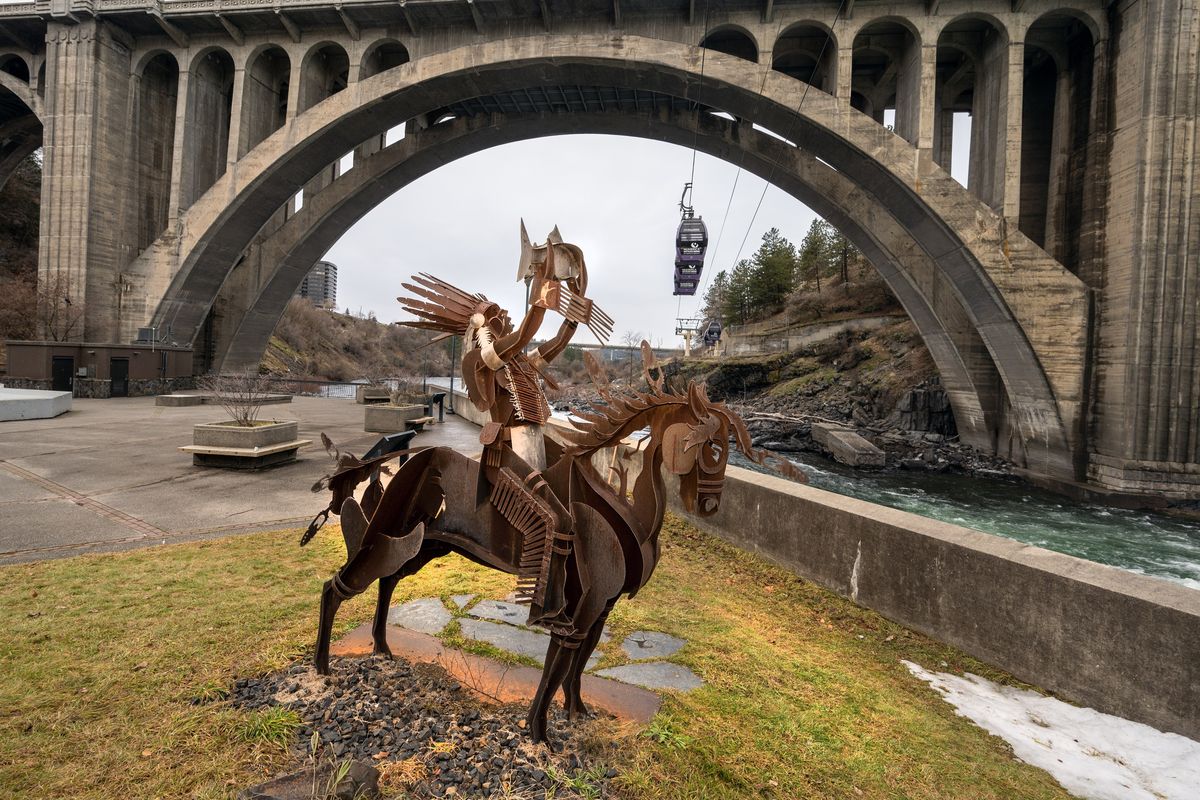Smoker Marchand, sculptor of ‘The Salmon Chief’ at Spokane Falls, dies at 71

A Colville Tribe member who crafted landmark sculptures of Native Americans in Spokane and throughout the West, died Friday.
Virgil “Smoker” Marchand, a member of the Colville Business Council representing Omak, Washington, was 71.
The Confederated Tribes of the Colville Reservation announced that its government offices would be closed Thursday and Friday in his honor.
“Not only will his memory live on through his art and sculptures, but through all of the lives Smoker has impacted over the years,” the announcement stated. “Our thoughts and prayers are with his family, friends, and communities during this time.”
Sitting on horseback, The Salmon Chief blesses a salmon he holds above his head as he faces the Spokane Tribe’s traditional fishing grounds at Spokane Falls in Huntington Park. Marchand built the 12-foot steel sculpture when the park was dedicated in 2014. It represents the salmon chiefs who regulated annual fishing on the river to ensure that all area tribes had enough to last through winter. Two women dry salmon on the cliffs behind the chief.
The theme continues with another installation above the park at A Place of Truths Plaza, dedicated in 2019, along Spokane Falls Boulevard. Collaborating with Spokane Tribe artist Jeff Ferguson, Marchand created 10 figures of sacred animals and of Fisher People practicing spearing, netting and trapping. They serve as a reminder of Spokane’s Indigenous heritage and the importance of preserving the river running through it.
Hundreds more of Marchand’s figures are scattered across the Northwest. Many feature the spiritual connection of horsemen, such as his sculpture of a horseback warrior holding up a peace pipe for the Coeur d’Alene Tribe Veterans Memorial at the Trail of the Coeur d’Alenes trailhead in Plummer, Idaho.
Native Americans came to regard the horse as “an extension of their own being,” he told The Spokesman-Review in 2010.
Often within the figures, cut-out silhouettes depict other symbolic animals like buffalo, coyotes and eagles.
“He was the friendliest guy you could ever talk to,” said his brother-in-law, William Womer. “He had a great sense of humor. He was very meticulous when he talked about things. Everyone in the family loved him.”
Marchand was a member of the Arrow Lakes Band of the Colville Confederated Tribes. His nickname came from his grandmother, Mary Marchand. She gave him his Indian name, Spa Poole, which means smoke.
His brother encouraged him to attend the Institute of American Indian Arts in Santa Fe, New Mexico, where Marchand graduated in 1971.
He went to work for the Colville Tribe in 1977, when he designed the tribe’s logo. He spent most of his career in the tribe’s planning department, creating his artwork on the side.
Although he is most known for his steelwork, Marchand worked in many mediums. He started with painting and drawing.
In 1995, he illustrated “A River Lost” a children’s book by Lynn Bragg about how the Grand Coulee Dam destroyed a way of life for members of the Arrow Lakes.
He tried woodcarving and ice carving. He dabbled in bronze casting. But eventually steelwork became his favorite medium.
For many years, his uncle Gary McClung mentored and assisted him in welding his sculptures.
More Marchand figures can be seen on the Colville Reservation. A group of women dig for roots along Highway 155 near Grand Coulee. Farther down the road, a Sasquatch stands on a mountain pass near Omak.
The Osoyoos Indian Band in British Columbia, who share heritage with the Okanogan people, commissioned him to do numerous works. And the San Carlos Apache Tribe commissioned a sculpture commemorating Geronimo in Arizona. Womer said he was especially proud of that one.
“Smoker was a strong voice for his people and he brought a unique perspective to tribal government,” said Jarred-Michael Erickson, chairman of the Colville Tribe. “We will all miss him.”